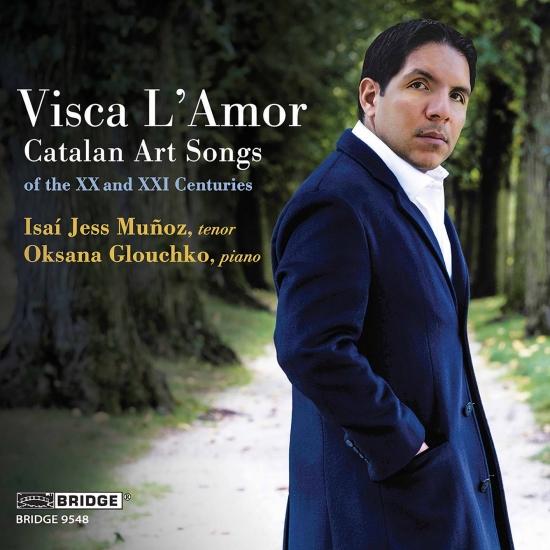 Visca L’Amor: Catalan Art Songs of the XX and XXI Centuries, 2021. Isaí Jessi Muñoz, tenor; Oksana Glouchka, pianist. Contents: La Rosa als Llavis (Eduard Toldrà); Cants Homèrics (Ricard Lamote); Haidé (Narcis Bonet); Combat del Somni (Frederic Mompou); Imitació del foc (Elisenda Fábregas); Les Paraules Sagrades (Joan Comellas). Compact Disc, 22 Tracks (45:39). https://bridgerecords.com/products/9548. $14.99.
Visca L’Amor: Catalan Art Songs of the XX and XXI Centuries, 2021. Isaí Jessi Muñoz, tenor; Oksana Glouchka, pianist. Contents: La Rosa als Llavis (Eduard Toldrà); Cants Homèrics (Ricard Lamote); Haidé (Narcis Bonet); Combat del Somni (Frederic Mompou); Imitació del foc (Elisenda Fábregas); Les Paraules Sagrades (Joan Comellas). Compact Disc, 22 Tracks (45:39). https://bridgerecords.com/products/9548. $14.99.
Visca L’Amor (“Long Live Love”) is an engaging guided tour through the world of 20th and 21st century Catalan art song. Isaí Jess Muñoz and Oksana Glouchko masterfully demonstrate their musical sensitivity, and also showcase their strong commitment to finding and performing what is unfortunately unusual repertoire.
Songs in Catalan are rarely heard today, a result of the widespread repression of the Catalan language by the fascist dictator Francisco Franco from the 1930s to the 1970s. Both performers are to be applauded for raising the profile of this genre outside of Spain, and deserve special credit for their commissioning of the song cycle Imitatió del foc (Imitation of Fire) from the Barcelona-based composer Elisenda Fábregas. These four songs on texts by Balearic poet Bartomeu Rosselló-Pòrcel are remarkable in their mixture of playful and serious moments. The third piece in the set, “Pluja Brodada” (“Rain Embroidered”), has frolicsome text painting in the piano to reflect the changing patterns of a cleansing rain; The compositional finesse on display here is reminiscent of past masters such as Franz Schubert or Hugo Wolf. At the piano, Glouchko moves fluidly through the ever-shifting figures with virtuosic ease. Muñoz has a smooth tenderness in all registers of his voice. In both his fortes and pianos he finds the delicate balance between expressing the meaning of the text and producing an unceasingly beautiful tone.
The recording opens with a set of songs composed by Eduard Toldrà: La rosa als llavis (The Rose on the Lips). These short songs each set markedly different moods, matching the poetic material. The almost drunken flirtatiousness of “i el vent deixava dintre la rosella” (“The wind left inside the poppy”) juxtaposes with the somber “Seré a ta cambra amiga” (“I’ll be in your room, my friend”) which follows. The non-Catalan-speaking listener won’t feel left out; the communicative and accessible performances keep the ear engaged.
The recording closes with a set of religious songs set to short, familiar Latin texts, three of which are only made up of the word “Alleluia.” These songs function as an aural dessert after a lavish meal for the listener, combining compositional language reminiscent of the earlier tracks with the sweet simplicity of just a few simple words. At times minimalistic and celebratory, the brightly tonal harmonic language leaves the listener looking forward to starting the journey all over again.
In his excellent liner notes, Muñoz writes about the inaccessibility of music by Catalan composers outside of Catalonia due to the Francoist regime. This recording only scratches the surface of an art form that has great depth and diversity in output. It is to be hoped that Muñoz and Glouchko continue to help make Catalan art songs accessible to both audiences and performers in the coming years.


